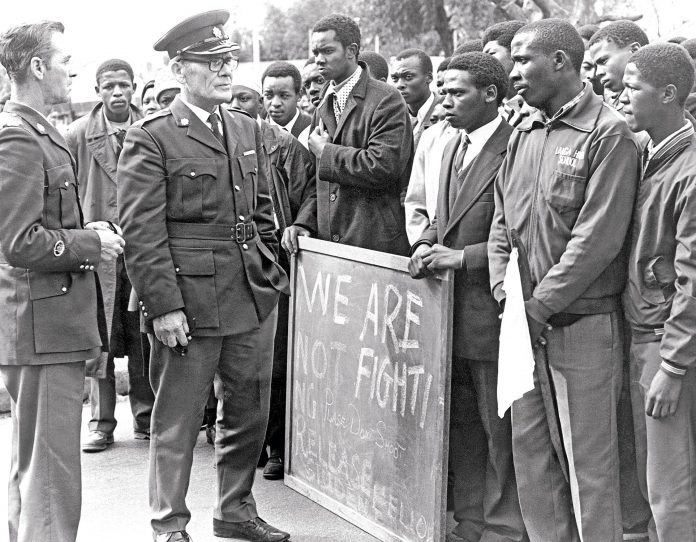Johannesburg- I hosted the brilliant philosopher Lewis Gordon recently on my podcast, In The Ring With Eusebius McKaiser.
We had a philosophical conversation about non-racialism: what it means, and whether it is desirable. I am more convinced than ever that non-racialism should be ditched.
Non-racialism is particularly popular among many older South Africans who yearn for a period, like the mid-80s in the final push against apartheid, when there was some consensus, of sorts, in the mass democratic movement that we should not reduce our identities to race, even in the face of a racist regime.
[membership level=”1″]Many people who advocate for non-racialism are really just advocating for colour-blindness. These are people we should be suspicious of.
They want to co-opt the term non-racialism in order to eliminate race from our language, and from state policies. But that is disingenuous.
The structural and other consequences of colonialism and apartheid do not disappear just because you sign up for language that eliminates all references to our racialized realities. You have to deal with the very real harms of racism rather than to render those harms invisible in an orgy of non-racialism.
Many advocates of non-racialism are the children of colonial and apartheid hegemonies. They want to pull the wool over our eyes by agitating for a society in which “race does not matter” but without doing the reparatory and justice work that would get us there, truly.
Some of my friends who are deeply committed to racial justice and egalitarianism also, however, punt an ideology of non-racialism, still.
They cannot be accused of colour-blindness and of trying to preserve colonial outcomes by side-stepping tough, urgent, moral questions about unjust wealth acquisition.
To these friends I say, abandon the word “non-racialism” and subsume your justice project under the clearer idea of “anti-racism”.
When we commit to fighting for institutions that are, and for a society at large that is, anti-racist, we thereby signal several things. To be opposed to something – anti-racist – is to acknowledge that you need to be active and not passive in the fight against that evil, racism.
That alone is sufficient reason to commit to anti-racism and not invest in reviving the term “non-racialism”, which has become an ambiguous concept weaponized by many beneficiaries of racism.
In addition, while race is biologically incoherent, the social and political construction of race is real, in deep phenomenological ways that are not inherently poisonous. Putting racialism on trial is a distraction. It is racism that should be on trial.
That, too, is a good hermeneutical reason why the explicit reference to racism in “anti-racism” is preferable to the term “non-racialism”. We need to make racists, and beneficiaries of racism, uncomfortable.
They must know that we will not mince our words when we experience racism and the injustices related to intergenerational wealth with racist historical roots.
“Non-racialism” is too linguistically and politically tame to serve the urgency of the modern pushback against racism’s enduring architecture in our midst. An anti-racist project instantly animates the fight against that racist architecture.
That is not to say political activism is reducible to language games. We have a lot of social, economic and political work to do to march towards an anti-racist society. We would have to map out that journey.
But if you do not describe your goal accurately, then you are reducing your chances of achieving it. That is why it matters what we think we are desiring. This is the epistemic reason why I am vested in a critical debate about the usage of the vision of a non-racial South Africa. Everyone who is committed to anti-racism is against race reductionism. But not everyone punting non-racialism is truly committed to anti-racism.
That is why we must be on our guard when non-racialists start speaking.
- Eusebius McKaiser is a political analyst, broadcaster and author

To read more political news and views from this week’s newspaper, click here.
Follow @SundayWorldZA on Twitter and @sundayworldza on Instagram, or like our Facebook Page, Sunday World, by clicking here for the latest breaking news in South Africa. To Subscribe to Sunday World, click here.
Sunday World
[/membership] [pmpro_signup submit_button=”Register” level=”1″ login=”1″ redirect=”referrer” short=”false” title=”Register to view Exclusive Content” short=”true” custom_fields=”true”]


